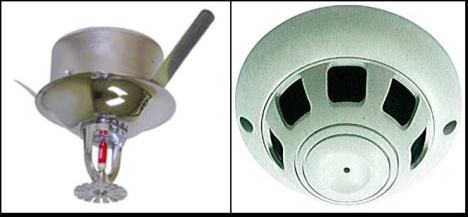What are these items?

If you’re like me, you would say these are a sprinkler head and a smoke detector. You would be wrong.
In fact, these are non-operable fakes. Instead, they contain tiny surveillance cameras and they are now illegal in Illinois since they are non-functioning.
Fire and Life Safety Device Act Public Act 95-946. New criminal penalties will be in effect as of January 1, 2009, for persons who manufacture, install or sell any device or object that appears to be a smoke detector, sprinkler head, carbon monoxide alarm, heat detector or any other similar device used for life safety or fire protection but in fact is not capable of performing such function. Violators are guilty of a petty offense subject to a $100 fine for the first offense, $500 for a second offense and $1,000 for a third or subsequent offense. Each day that a device is installed in violation constitutes a separate offense. Local governmental inspectors and licensed fire sprinkler contractors are authorized to inspect devices to ensure compliance but no inspections can be conducted in any single family residence or living unit of a multi-family residence or mixed use building.
More Laws
High School Consumer Education Public Act 95-863. Beginning in 2009 consumer education courses taken by high school students will include instruction in the area of homeownership, including the basic process of obtaining a mortgage and the concepts of fixed and adjustable rate mortgages, subprime loans and predatory lending.
Notice of Annexation Public Act 95-931. When a municipality seeks to annex certain unincorporated territory, notice must be published in a newspaper no less than 10 days before the passage of an annexation ordinance. Beginning January 1, 2009, a municipality will ALSO be required, not less than 15 days before the passage of the annexation ordinance, to provide written notification of the planned annexation to the taxpayers within the territory. This notice must either be given to the taxpayer of record in person or sent by certified mail. Once notice of the proposed annexation is given, other municipalities are prohibited from annexing the proposed territory for 60 days from the date the notice is mailed or delivered to the taxpayers.
Foreclosure Actions Public Act 95-961 will require a homeowner notice to be attached to the summons in all residential foreclosure actions. The notice will provide the homeowner basic information about the foreclosure process and their rights. The new law outlines a procedure for the homeowner to request a payoff demand statement from the lender and provides for damages if this notice is not provided in a timely manner. A homeowner may also recover attorney’s fees if they prevail in the foreclosure action.
Lawn Sprinkler Systems Public Act 95-421. All landscape irrigation systems installed after January 1, 2009, will be required to have furnished and installed technology that will prevent or stop operation of the sprinkler system during rainfall. The technology is required to be adjustable either by the user or the irrigation contractor. Systems operated on golf courses or agricultural lands are NOT covered by the new law.
Effective January 1, 2009, a new provision added to the Real Estate License Act [225 ILCS 454/20-20 (h) (8) (B)] significantly shortens the time frame within which certain instances escrow moneys must be deemed abandoned and transferred to the Office of the State Treasurer and handled as unclaimed property pursuant to the Uniform Disposition of Unclaimed Property Act. Currently earnest monies held in escrow for a period of five years after a transaction fails to close are to be treated as unclaimed property and turned over to the State Treasurer. This new provision requires that earnest moneys held in escrow be deemed “abandoned” in the absence of disbursement, if the transaction fails to close, in the absence of the filing of a claim in a court of competent jurisdiction and if six months have elapsed from the receipt by the broker of a written demand for the escrow moneys by either principal to the transaction or either principal’s duly authorized agent.
(Under the current law a licensee must maintain all escrow moneys in a special account, separate and apart from personal and other business accounts, all escrow moneys belonging to others until the transactions are consummated or terminated, except to the extent that the moneys (or any part thereof) are disbursed in accordance with (1) the written direction of the principals, or their duly authorized agents, to the transaction (2) directions providing for the release, payment or distribution of escrow moneys contained in any written contract signed by the principals to the transaction, or their duly authorized agents OR (3) pursuant to an order of a court of competent jurisdiction.)
From Illinois Realtor
Filed under: Landlord/Tenant Law | Tagged: fake smoke detector, fake sprinkler, illinois law, real estate, real estate law | Leave a comment »


